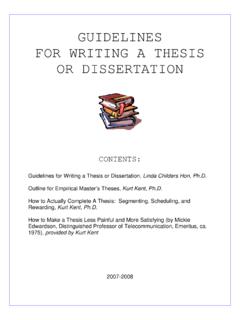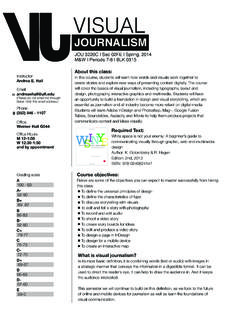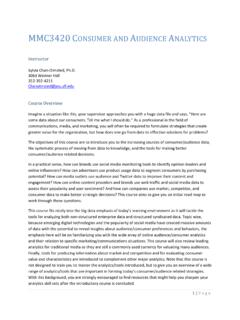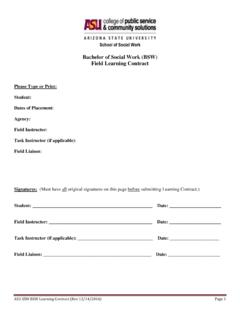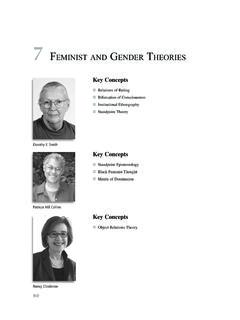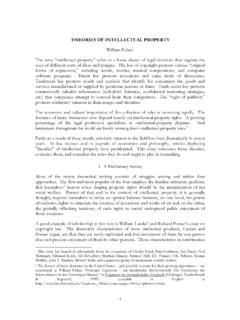Transcription of Theories of Public Relations - UF College of Journalism ...
1 1 Theories of Public Relations Fall 2017, Section 9499 Instructor: Dr. Linda Hon Email: Phone: 352-294-2745 Office Hours: Wednesday, 9:30 10:30; 12:00 2:00 Other times by appointment. Course Website: Technical Help: For technical issues with course access or e-learning in Canvas, contact UF Helpdesk at / (352) 392-HELP (4357) / Course Communication: Please email me directly at the ufl account listed above. Course Description: This course covers main emphases in Public Relations theory and their applications to practice. Course Objectives: By the end of this course, students will: - Possess comprehensive knowledge of major areas of Public Relations theory and how those areas have been developed through empirical research.
2 - Be able to apply abstract theoretical models and concepts from Public Relations scholarship to Public Relations practice. - Understand the elements of an effective research proposal and develop a proposal suitable for a master s thesis or a manuscript for an academic research conference. Expectations: Students are expected to complete work on time and participate in class discussions in a professional manner while respecting the instructor and fellow students. These discussions are not limited to the Canvas shell, but all platforms that involve coursework. Required Readings and Reaction Assignments Required Readings are listed in the course schedule and are available as PDFs for each weekly module on Canvas. The article PDFs are also available in the Announcements tab on Canvas (See Announcement 1).
3 Reaction Assignments are listed in each weekly module on Canvas. Teaching Philosophy: I see myself as a facilitator. My experience and background provide me with expertise in Public Relations theory and practice. However, there are no facts in Public Relations theory that I will communicate to you. The course materials I have selected and the assignments I have developed are designed to introduce you to main areas of Public Relations theory so you can make the connection from academic research to Public Relations practice. 2 Instructional Methods: Because theory is based on empirical (data-based) scholarship, much of the class involves reading research literature. All the literature comes from peer-reviewed journals, particularly several main journals focusing on Public Relations Journal of Public Relations Research, Journal of Public Relations , and Public Relations Review.
4 I have selected foundational articles that trace the development of a major theoretical program of research and/or research articles that are current and have to do with important trends in industry. And for each week, I have developed an assignment that is designed to elaborate on the reading material by linking it to professional practice. I hope much of the learning in this class is peer-to-peer. Each student brings his or her life history and work experience to the class. Therefore, you will be sharing your discussion posts and reaction assignments with one another and providing constructive feedback to one another. Course Policies: Late Work and Make-up Policy: Deadlines are critical to this class. All work is due on or before the due date.
5 Extensions for deadlines will only be for preapproved emergencies. With this in mind there will be penalties for late work: Less than an hour late 5 points off More than an hour late but less than 24 hours late 10 points off More than 24 hours late but less than 48 hours late 15 points off More than 48 hours late 25 points off A week or more late Not accepted at all Emergency and extenuating circumstances policy: Students who face emergencies, such as a major personal medical issue, a death in the family, serious illness of a family member, or other situations beyond their control should notify their instructors immediately. Students are also advised to contact the Dean of Students Office if they would like more information on the medical withdrawal or drop process: Students must inform their academic advisor before dropping a course, whether for medical or non-medical reasons.
6 Your advisor will assist with notifying professors and go over options for how to proceed with their classes. Requirements for class attendance and make-up exams, assignments, and other work in this course are consistent with university policies that can be found in the online catalogue at: Requirements for all graded course assignments are consistent with university attendance policies that can be found in the online catalogue at: 3 Assignments: Assignments should be submitted through Canvas. Discussion Posts and Responses to Another Student s Post Research Proposal--Preliminary Idea Research Proposal Final Draft Research Proposal--Final Deadlines: The deadlines for graded material are as follows: Discussion Posts 11:59 PM EST Sundays Comments on Another Student s Post 11:59 PM EST Mondays Research Proposal Preliminary Idea 11:59 PM EST Wed.
7 , Oct. 18 Final Draft 11:59 PM EST Wed., Nov. 29 Final Proposal 11:59 PM EST Mon., Dec. 11 Grading: Your work will be evaluated according to this distribution (100-point scale): Discussion Posts 40% Class Discussion (Discussion Posts and Reaction Assignments) 40% Research Proposal Preliminry Idea 3 % Draft 7 % Final 10 % The final grade will be determined as follows. Grades will be rounded up ( , becomes 90). A 100% to 93% A- < 92% to 90% B+ < 90% to 87% B < 87% to 83% B- < 82% to 80% C+ < 80% to 77% C < 77% to 73% C- < 72% to 70% D+ < 70% to 67% D < 67% to 63% D- < 62% to 60% F < 59% to 0% 4 Discussion Posts and Responses to Another Student s Post You are expected to read all of the course materials each week.
8 Since there are no exams, you will be graded according to how well you incorporate specifics from all of the readings that demonstrate mastery of the material. Students will post an answer to the instructor prompt about the lecture and readings (750 words maximum) by 11:59 Sunday of each week. Students are required to respond to another team member s post (250 words maximum) by 11:59 Monday of each week. For specific grading information, please refer to Rubric for Discussion Participation and Comments to Another Student s Post. Class Discussion and Reaction Assignments: Students must be prepared to engage in class discussion about the week s assigned readings and discussion posts. Each discussion prompt will be available on Canvas a week ahead of the class the discussion prompt and posts are scheduled to be discussed.
9 Please remember it is your responsibility to check the Canvas site. Students must read or view the content of the material in the week s reaction assignment before class and be prepared to engage in class discussion and/or exercises for each reaction assignment. Each reaction assignment will be available on Canvas a week ahead of the class the reaction assignment is schedule to be discussed. Please remember it is your responsibility to check the Canvas site. For specific grading information, please refer to Rubric for Class Discussion. Research Proposal The capstone assignment for the course will be a research proposal appropriate for your thesis (or a conference paper for doctoral students). The proposal will be divided into three steps preliminary idea, final draft, and final proposal.
10 You should follow the guidelines for writing a research proposal found here: Your preliminary idea, final draft, and final proposal must conform to the style guidelines of the American Psychological Association. A helpful source is available at: Preliminary idea (due Oct. 18, 11:59 ) This should be two pages (double-spaced, 12-point type, one-inch margins). Submit as a Word file in Canvas. Include the Title of your proposal and a synopsis of the preliminary main sections Introduction, Background and Significance, Literature Review, and Proposed Research Design and Methods, and Preliminary Suppositions and Implications. 5 The Citations (References) should be at the end of the document on a separate page (or pages). Final Draft (due November 29, 11:59 ) This is a 10-15 page (not including references, tables, and figures) final draft of your research proposal.
